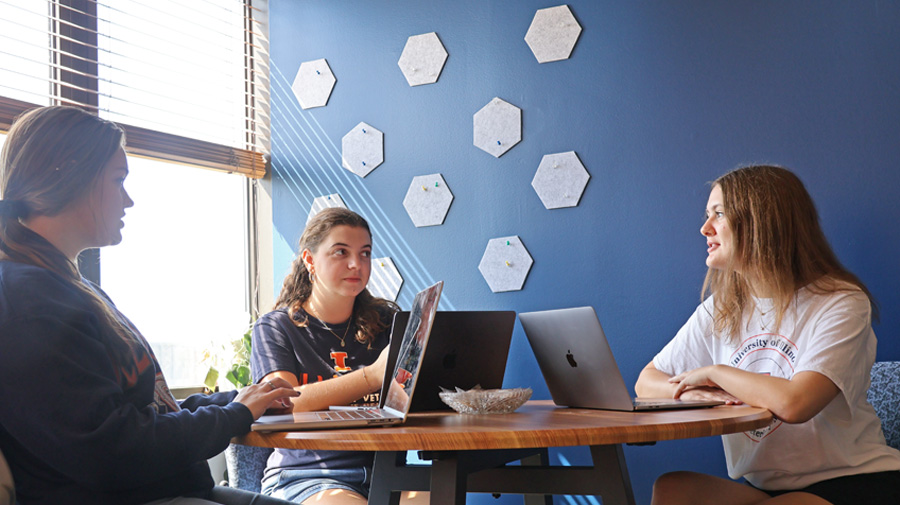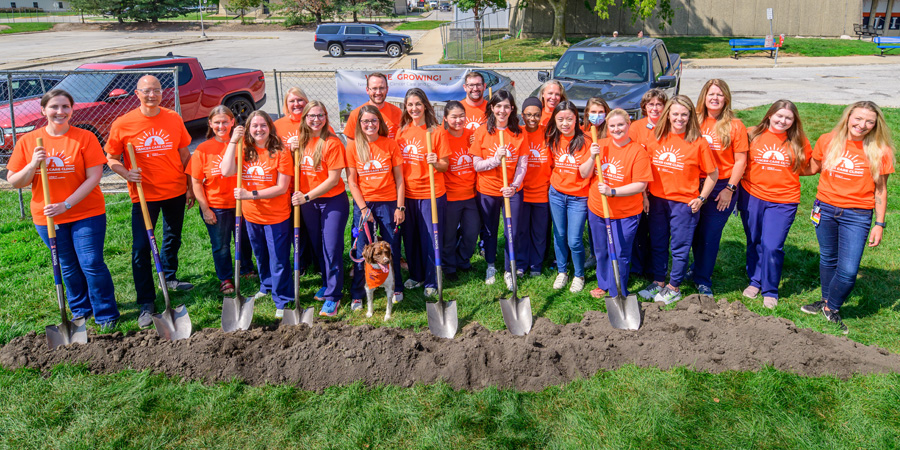This message will appear in the Illinois State Veterinary Medical Association Epitome.
Two students in our DVM Class of 2025 received highly competitive scholarships from the American Association of Veterinary Medical Colleges (AAVMC) this year. The awards, for leadership in diversity, equity, and inclusion (DEI), recognized the students’ efforts to create opportunities for students from underrepresented communities.
Meet the Scholarship Recipients
Melanie Narvaez was selected for the Chewy Veterinary Leaders Program. This program, offered for the first time, combines $20,000 in financial assistance with mentorship support throughout the fourth year of study and continuing after graduation. Narvaez was one of only 15 veterinary students nationally chosen to participate.
As president of the Illinois student chapter of the Latinx Veterinary Medical Association (LVMA), she planned Latin dance workshops and helped initiate the college’s annual Latin Night. She also helped raise awareness of invisible disabilities.
Naomi Esquivel was one of 22 veterinary students to receive the Merck Animal Health Diversity Leadership Scholarship. Additionally, she was chosen from among the 22 Merck winners to receive the AAVMC Patricia M. Lowrie Diversity Leadership Scholarship. This honor recognizes a student who has shown exemplary promise as a future leader in enhancing diversity, equity, and inclusion within academic veterinary medicine.
Esquivel helped create an Open House booth hosted by the LVMA chapter. And she worked with Chicago organizations to bring 55 high school students from Latine neighborhoods to the event. Because of her initiative, and the value students gained from their visit, organizers plan to continue bringing busloads of young people to future Open House.
We are exceedingly proud of both students. After graduation, they plan to return to their native Chicago to practice medicine and continue their outreach activities.
Valuing Diversity
Bringing diversity to the veterinary profession is a core goal for all veterinary colleges. As articulated by the AAVMC, the health and wellbeing of animals and people are best served by a diverse student and faculty community, inclusive institutional climates in academia and in practices, and veterinarians who demonstrate cultural competence. At heart, diversity initiatives embrace and value the differences among individuals while affording equitable treatment and access to resources to all individuals.
The DEI committee of the Illinois State Veterinary Medicine Association (ISVMA) has partnered with our college in many ways, including tapping into Open House to introduce youth from underrepresented backgrounds to the veterinary profession. In April, the committee hosted a social mixer for current veterinary students to give students a sense of connection, both with one another and with the ISVMA.
The group of ISVMA members who led this event was itself rather diverse. It included DEI committee co-chairs Drs. Shannon Greeley and Amanda Hampton and Drs. Martha Armour, Simuel Hampton, and Laura Reynolds, representing practitioners from downstate and from the Chicago metro area and veterinarians who have practiced from 6 to 25 years.
Our college is making progress in diversifying the veterinary student body. Since 2021, about one in four newly admitted Illinois veterinary students has had a background historically underrepresented in veterinary medicine. While moving toward a demographic among veterinary professionals that reflects society as a whole is an important step, mere representation is not enough.
Diversity’s True Benefits
I’ve often heard the remark that diverse teams outperform homogeneous ones. The claim may have originated with a 1996 study reported in the Harvard Business Review. In 2020, those authors clarified the interpretation of their earlier work to emphasis that diversity-associated performance benefits are realized only under “conditions that foster inquiry, egalitarianism, and learning.”
In fact, the article states, tapping into the true benefits of diversity means giving all team members “the power to help set the agenda, influence what—and how—work is done, have one’s needs and interests taken into account, and have one’s contributions recognized and rewarded with further opportunities to contribute and advance.” Programs like those undertaken by ISVMA and AAVMC and efforts like those led by Melanie and Naomi are having an impact. Our profession doesn’t look the same as it did 30 or even 10 years ago. If we embrace our differences and provide equal access to opportunities, the result will be a stronger and more effective veterinary profession. — Dean Peter Constable




